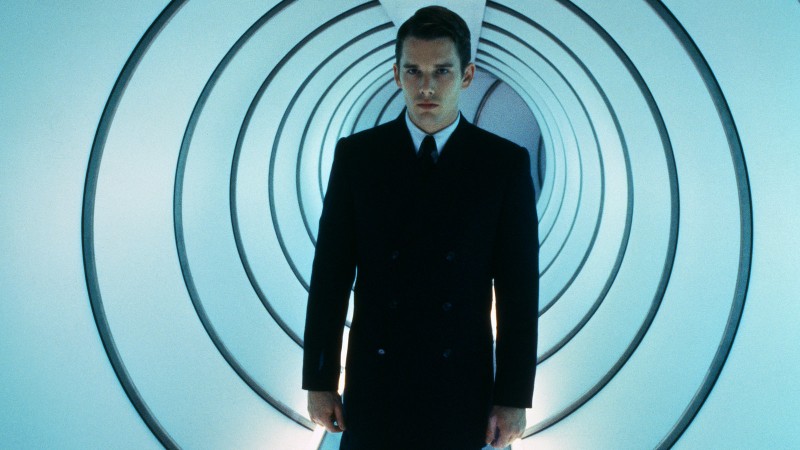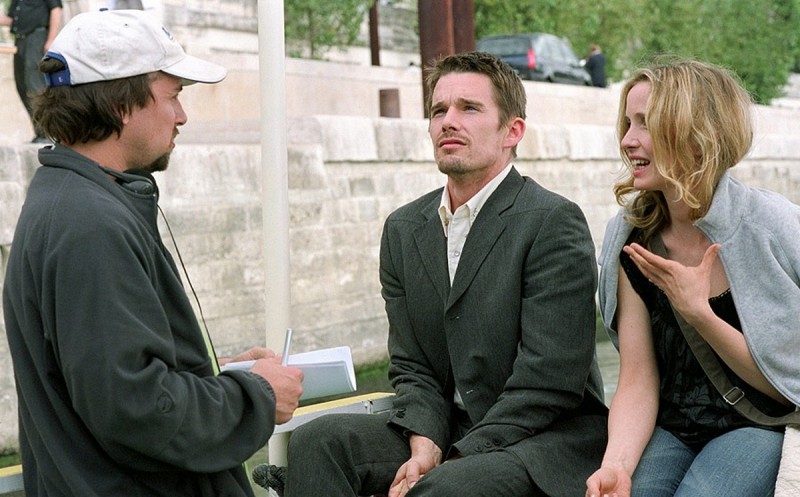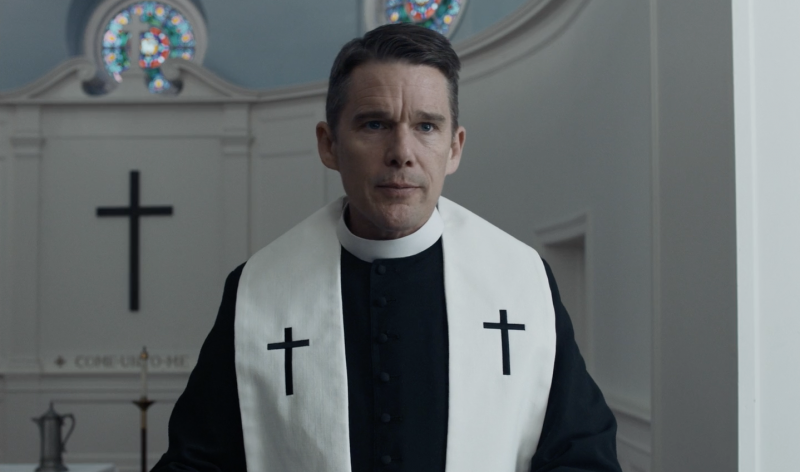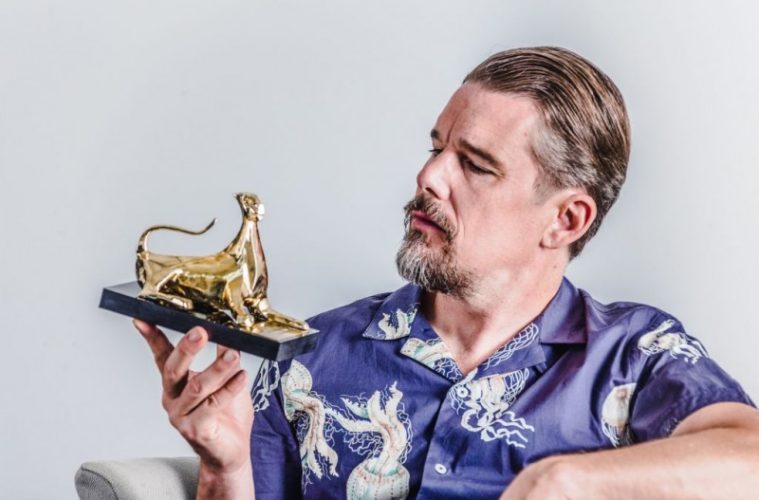Despite first appearing on screens a whopping 33 years ago in Joe Dante’s Explorers, the formidable actor and filmmaker Ethan Hawke seems busier than ever these days. We met up with him at the Locarno Film Festival this summer (where he was being honoured with a somewhat premature lifetime achievement award) for a lengthy chat about First Reformed, Christian Bale, River Phoenix, Boyhood pride, where the Before films might be headed next, and how this is certainly not his McConaughey moment.
Decked out in a Hawaiian shirt in a room looking out to the sun covered Lugano Prealps, we found him in a fittingly blue skies mood. The relaxed Texan was first to draw…
Ethan Hawke: Is the festival going well?
The Film Stage: It is! It’s hot.
It’s really hot! I was introducing Seymour today and I felt bad. Before the movie even started everybody’s got a fan and they’re fanning themselves.
How does it feel at this stage to be getting a lifetime achievement award when you’re seemingly busier then you’ve ever been?
Well, I feel several things. I remember Sidney Lumet, at the end of his life, kept saying, “Everyone wants to give me a lifetime achievement award, but they don’t wanna let me make another movie.” You know, they all want me to be out to pasture, grazing at the film festivals of the world. So on one level I feel completely undeserving and on another level I feel like… well, Linklater told me, “Don’t get too high on yourself. These are what you call midcareer check-ins. It means that you’ve made it to this one stage and now in the next round everyone will hate you again very soon and they’ll say you’re washed up and then you have to survive long enough to get to the next round, where they invite you to be the head of the jury.” So I’m in the front tier of the second row.
You mention “midcareer check-ins” but it seems as if you’ve had a charmed career. You’ve never really had the bumps that everybody else has had.
Well, thank you for saying that. I hope that that’s true. I’ll tell you something funny. There was some article written in a magazine that was talking about, with the success of First Reformed and the reception of Blazed, that I was poised to have the best year of my life at that I may be having my “Matthew McConaughey moment.” And my friend Richard Linklater left me a message that was so sweet and charming, because he loves both of us, that said, “But you can’t have a Matthew McConaughey moment, because for you to have a Matthew McConaughey moment you would have had to be washed up. What they can’t write is that you’ve actually kind of consistently done the same thing for you’re whole entire life and sometimes they get it and sometimes they don’t.”
So yeah, I’ve been lucky that way. But I think that one of the reasons why luck has given me that charm is because really early on I’ve tried to solve all my problems with working. When my first marriage fell apart, one of the saddest darkest times of my life, I just worked harder than ever. That’s when I went back to the theater, and the theater for actors is a great healer. Because it’s incredibly hard and I think that whenever you really apply yourself humility naturally arises because you meet your own walls, you come up against them.
So I hope that that’s true. It’s also strange to be 47 and also have been making movies for over thirty years. It’s a little rare actually. The other day I saw Christian Bale in a movie and I felt this sense of pride for him for how talented he is, what a good actor he is. I realized that the first time I was jealous of Christian Bale, I think I was 19. Because I had been the youngest client at my agency until they signed Christian Bale. There was this huge list. They represented Robert Redford, Paul Newman, blah blah blah, you know, Warren Beatty. And I was really proud to be on it, I was the youngest one. And the next year there was this other guy, younger guy, “Christian Bale,” who the hell’s that?! And I was like: aw shit, I’m never gonna forget him.

Andrew Niccol said recently that what he values most in you is this inherent goodness, a sort of decency that immediately shows, and that you would hate him for saying that.
Well, being proud of being good doesn’t really make any sense because if you’re good you’d realize that pride would be an obstacle. We’re always failing ourselves all the time and there are so many ways that I’m not good and when I was younger, first meeting Andrew, the truth is you don’t want to be perceived as being good cause you feel that’s not gonna have an edge or be cool or be interesting, the way young actors like to be interesting, right?
One of the things that is most interesting to me in my age right now is that I have a 20-year-old daughter and she would love to be in front of you right now, that is her dream: to have a movie that she felt proud of and that she could be here and talk to you guys and be asked these questions. It’s fascinating for me to have somebody that looks at life like that. So all of a sudden I’m aware of what a wonderful seat this is to be in. She thinks I’m a little bit better than I am, right? And you start wanting to be that person.
One of the problems with contemporary culture is that there is a tremendous amount of energy put into trying to help 18-year-olds be 35 or, you know, 22-year-olds be 40. But there’s not a big amount of energy put into helping 40-year-olds become 80. You know, there’s no university for it. One of the ways I do it is to make a documentary like Seymour, one of the ways is to work with people I admire, like Andrew Niccol and Antoine Fuqua.
One of the great things about being an actor is that… Antoine is never on anyone else’s set, really. Richard Linklater hasn’t spent much time on anyone else’s set. He thinks making a movie is being Richard Linklater but being in a Richard Linklater film is very different from being in an Antoine Fuqua film and that’s very different from being in an Alfonso Cuarón movie which is very different to being in a Sidney Lumet movie and I’ve gotten the opportunity to see how different sensibilities attack a film set and how they can be different. And there isn’t one right way to make a movie. Paul Schrader gave me one of the best parts of my life and it’s very different than being on the set of Before Sunrise. It’s hardly the same job almost.
I think that Gattaca is one of the best first films of all time. [Andrew Niccol] came out of the gate with something powerful to say. Studios don’t make movies like Gattaca anymore. That movie was made by a Hollywood studio, with money! Now, if you had that script you’d be making it for one-half the time, one-eighth of the price and all the actors would have to have a back-end deal, where you make money if the movie makes money. The movie wouldn’t make any money because it didn’t at the time. I miss that. What I was trying to say was that Andrew thinks I’m good because we’ve been good to each other. The weekend that movie came out I went for a walk around Brooklyn with him and he was so sad. He said the studio couldn’t find one quote to put for next week’s ad. It was already being pulled from theaters because they didn’t have one superlative. You know: Uma Thurman is excellent. A sci-fi thriller that thrills and chills. Not one quote! His eyes were on fire. “We can’t get one quote. The movie came out in 50 fucking cities and we can’t get one quote.”
Of course, in a couple of weeks there were things but it was already too late. And when Before Sunrise came out everybody wanted it to be Reality Bites 2. They were all just completely disappointed. It was like what is this? You know? And 30 years later they’re still talking about that movie. I don’t know exactly what I’m trying to say but at a midcareer check-in I’m seeing the values of that.
Are we allowed to ask if there’s going to be another Before film?
You’re definitely allowed to ask. I don’t have an answer. I know that there’s a symmetry to those three movies that I really like. At the beginning of Before Sunrise it starts with this couple in their 40s fighting on a train and you pan over and see two young people listening and we turn into that couple. And there’s something beautiful about that. And the joke Julie makes at the end of Before Midnight that maybe we’re caught in some space-time continuum. You do get the feeling that that circle’s gonna keep going around. So it has a sense of completion to me as a trilogy, but I could imagine revisiting Jesse and Celine in some totally different way in some different kind of movie. I can’t remember the name of it right now but there was a movie about four years ago… great older actors, they’re dying…
Amour?
Yes, Amour! Julie wrote me and said, “Dammit, they already made the sequel!” [Laughs]
I wrote her the other day; I hope she doesn’t mind me saying. I had a dream the other day about the fourth movie and it was entirely erotic. It was full-blown erotic cinema. It would make Bertolucci blush. And she just wrote back “too late.” [Laughs] So we’ll see…

You were saying before about the spiritual background that you have and also that sense of what it means to be good. How did those thoughts feed into First Reformed?
Well, when I started First Reformed, Paul sent me the script, and on the first pages it talks about all the books that are on Reverend Toller’s desk and they were almost all books my mother had given me. This list of Thomas Merton, this book, that book and, like, I felt like I’d been prepared for this role.
It’s funny, Merton was writing in the ‘60s and he was already seeing an obsession with celebrity starting to happen and how a public self creates a fake self. And now with social media everyone has a public self and it’s all these things TS Elliot or Andy Warhol said that are all kind of coming true about this false self. One of the last times I spoke to River Phoenix he was talking a lot about how people perceived him and how hard it was to even know who you are if you’re constantly just trying to tell people what you’re not because whenever somebody tries to label you its inherently false because you’re definitely more than that or that might be flat out wrong or at least only partly right at best. And how hard that was to deal with and I realized that I wasn’t having that problem because I knew that was fake.
He’d just gone to the Oscars with that Sidney Lumet movie and he couldn’t believe how fake the Oscars were. “You’re not gonna believe, man, they’re so fake! It’s like you can knock these things over.” Meaning like: you think the statues look golden, they’re not gold they’re paper. “They go to the bathroom when they cut to commercial, it’s so fake you wouldn’t believe it! Most of these people are voting on movies they haven’t seen!” And I’m like: I know that. I remember actually thinking: if you’re trying to make me feel bad for you for going to the Oscars, fuck you!
[Laughs] But I realized now that understanding and accepting the phoniness of the world, you know, you gotta do it. You gotta accept it and move on and take it as a truth and not be hurt by it every time it happens.
Were you disappointed when Boyhood didn’t win that year?
That’s exactly my point, not at all! You want the work to be worthy but if you get caught up in seeing other people’s definitions… it wouldn’t affect the final cut of that movie one bit. In fact, I always tell people it’s always a little better if you don’t because if you don’t, for the rest of your life, people will tell you how it should have but if you do people, for the rest of your life, will tell you how it shouldn’t have.
I hate it when life always moves the goal line. We made a movie with our closest friends, for nothing, for over 12 years, about the subtle movements of growing up and actually, it found its way in the commercial marketplace, that’s a miracle. To then turn that into salty tears because you didn’t win the top prize… don’t give up your heart so easily. I wasn’t disappointed. I was so proud. I was so proud of Patricia for winning. I was so proud of us for being there. It was a miracle that we were there at all. I spent my life making little indie movies that nobody even hears of. And so, to turn that victory into a defeat would be a waste of time.
When you make The Purge or the Spierig brothers films, like Predestination, what’s the particular challenge in doing those?
Well, my first teacher was Joe Dante. And so by the time I was 20 years old I’d had these two great mentors. Peter Weir, who is a total art film connoisseur. I mean Peter Weir is like, “Have you seen Bresson? Come on get with it! You don’t even know who Fassbinder is? Wake up!” And Joe Dante is showing me The Howling and he was talking about how drive-in movies, if done with art and love, are actually like the Trojan horse. You go see a werewolf movie and secretly it’s a PTSD movie about the Vietnam War.
Get Out is a great example. Jason Blumhouse did both those movies, The Purge and Get Out, and I think Get Out is the completion of something Jason has been working towards for a long time, these Trojan horse movies. If I told you I was making an important film about race relations in America you definitely don’t want to come, you definitely feel like you’re being preached to and you start yawning immediately. The Purge is the same way. In the future, when rich people don’t care about poor people, they’re on their treadmills just watching people get burned alive on their TV, they flip the channel to find something more entertaining. “In the future…”
I love that because there’s something punk rock about it, it’s not what it seems. There’s a Cassavetes quote I love, “There’s no such thing as high art and low art, there’s good movies and bad movies.” The definition is: did the people who made it put their best love and ideas, did they work hard to complete what that thing is trying to be? If you spent time with James DeMonaco when he’s making The Purge, it’s an awful lot like being on a set with Richard Linklater making Boyhood. Paul Schrader is a great example. First Reformed gets put in the high art box but this is a guy who made Cat People and American Gigolo. He’s a sensationalist. He’s in love with the sex and violence of movies but that doesn’t mean that that’s only him. That doesn’t mean that if he makes a movie with sex and violence that there isn’t art put into it. A lot of people just put the sex and violence and they forget about the art.

Austin is a large part of your career and Blaze is another tale about Austin. The Karlovy Vary Film Festival recently honored the Austin Film Society.
Did Linklater show up?
He did! Do you think there are other stories to tell, more characters like Blaze perhaps?
The thing about certain cities is they become focal points. People from all over the world come there because they’re hearing about the legends. The short answer is: yes. But the long answer is: the whole world is like that. All these stories need to be told. We’re at this weird in-between place in time right now where it’s very possible for anybody in the world to make a good movie. You can shoot it on your phone. We’ve gotten to the place that Coppola was talking about when he was making Apocalypse Now, where if you have something to say, it’s like a novel. If you’ve been taught to read and write and you have some paper and a pen you can write a great novel. You can do it from jail; you can do it on a boat. And now the same is true with a movie. You can edit it on your computer; you can score it on your computer. And that’s changed the game.
Linklater loves to talk about when Slacker came out and 75% of the event of Slacker was, “Did you hear this kid from Austin made a movie for 16 grand?” And you kind of go: let me see that! It’s not like the movie’s so great–this is Rick talking by the way, I love the movie—but there was something incendiary about making it. It was an act of rebellion to the system of making movies in the early way, same as Robert Rodriguez when he made El Mariachi. That whole spirit was happening then and those guys all fused and then Tarantino found himself being drawn to that energy, and John Sayles, there was a lot of things that were cross-pollinating that didn’t organically come from there but that found their way there. Movements are always gonna happen and likeminded people are always gonna find likeminded people. We’re living in a moment now where the hard part is how to distribute it and how we all can know what to see because there’s so many Slackers out there now and most of them are terrible, so how do you find them?
I’m always astonished, I’m sure you are too, you can go on Apple TV now and see that Joaquin Phoenix and Gwyneth Paltrow made a movie together that I never heard of. What? And like, Matt Damon’s in a Clint Eastwood movie I never heard of? So many things get lost in the cracks and if those big names are getting lost, where are the Gattacas of right now? It might be like other art forms where it might take 50 years to curate what’s happening right now. That’s why film festivals have become so important because you guys at film festivals are like curators of, like, what does the world need to be paying attention to. What should be seen? If we didn’t have these festivals, big business would crush all these smaller movies.
Now we have the problem that they tell us Logan is a great movie. Well, it’s a great superhero movie. It still involves people in tights with metal coming out of their hands. It’s not Bresson. It’s not Bergman. But they talk about it like it is. I went to see Logan cause everyone was like, “This is a great movie” and I was like, “Really? No, this is a fine superhero movie.” There’s a difference but big business doesn’t think there’s a difference. Big business wants you to think that this is a great film because they wanna make money off of it.

